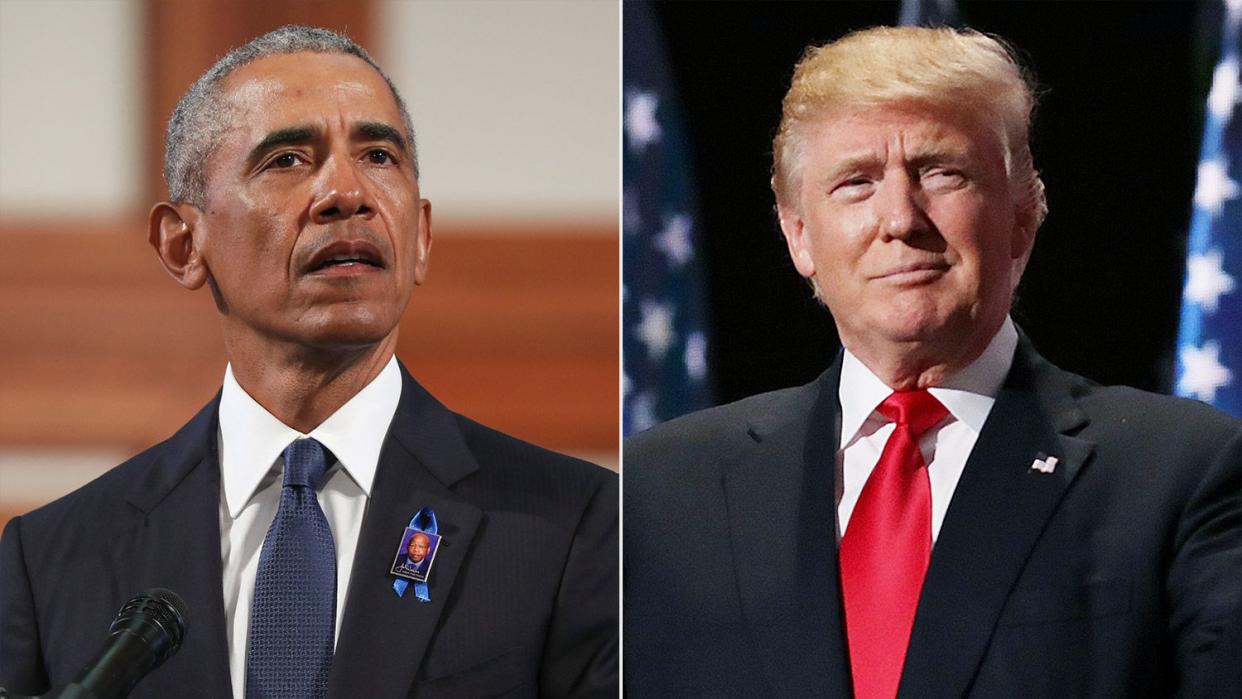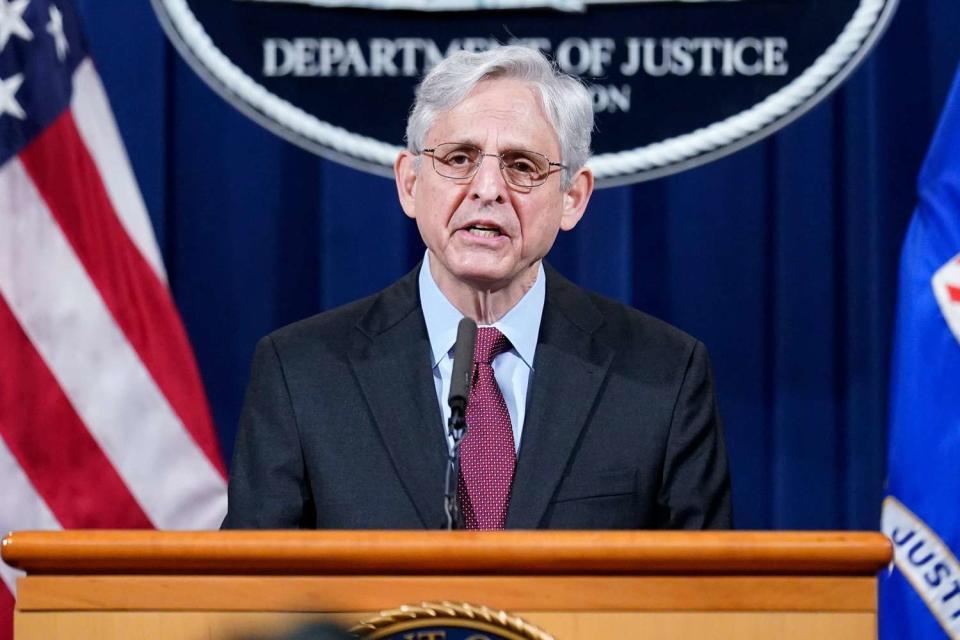Fact Check: Did Barack Obama Illegally Take 30 Million Pages of Documents to Chicago?

- Oops!Something went wrong.Please try again later.
- Oops!Something went wrong.Please try again later.
- Oops!Something went wrong.Please try again later.
Getty Images (2) Presidents Barack Obama and Donald Trump
President Barack Obama is the subject of a new line of whataboutism that's emerged from conservatives hoping to change focus of the FBI's search for sensitive documents at Donald Trump's Mar-a-Lago home to pretty much anything else.
It didn't take long for Trump and his supporters to begin sowing doubt about the reasons behind the search of the property in Palm Beach, Fla., on Monday, which was reportedly part of an ongoing criminal investigation into the alleged mishandling of White House records.
Trump called the search for documents — some of which were categorized as highly sensitive and potentially signify an obstruction of justice or violation of the Espionage Act — a "weaponization of the Justice System, and a coordinated attack by Radical Left Democrats."
His son, Eric Trump, claimed President Joe Biden "absolutely signed off" on the search, calling it part of an "absolute coordinated attack," despite assurances that the White House had no prior knowledge of it.
RELATED: The FBI's Mar-a-Lago Search Stemmed from an Informant: Report
Republican Sen. Rand Paul even suggested the FBI might have planted evidence by asking during a Fox News segment, "How do we know that they're going to be honest with us about what's actually in the boxes? How do we know that was in the box before it left the residence?"
Rand Paul suggests the FBI may have planted evidence in boxes they seized from Mar-a-Lago pic.twitter.com/3yd6I9tlaa
— Aaron Rupar (@atrupar) August 10, 2022
And then there's the whataboutism, a tactic Trump deployed immediately. "Hillary Clinton was allowed to delete and acid wash 33,000 E-mails AFTER they were subpoenaed by Congress," he said in an initial statement about the search.
Clinton may be an easy target for the MAGA crowd, but she's not the only one. Obama's now getting quite a few mentions as well.
RELATED: Unpacking the Far-Right Terminology Aiming to Discredit the Federal Investigation into Donald Trump
After The New York Post published an opinion piece, which claimed Obama sent 30 million pages of his administration's records to Chicago when he left office, Trump and his allies are running with the claim while ignoring key differences between how White House records were handled by the two former presidents.
"At the end of his presidency, Barack Obama trucked 30 million pages of his administration's records to Chicago ... More than five years after Obama's presidency ended, the National Archives webpage reveals that zero pages have been digitized & disclosed," Donald Trump Jr. tweeted Wednesday.
Fox News host Sean Hannity also made a declaration about Obama's alleged actions on his show: "They shipped 30 million pages of sensitive and possibly classified materials to Chicago, and, by the way, he has yet to return any of it to the National Archives. Not one page. So is his house about to get raided?"
RELATED: 'Donald Is Furious Yet Scared': Movement in FBI Investigation Complicates Trump's Plans
Trump himself asked on his social media site Truth Social, "What about the 30 million pages of documents taken from the White House to Chicago by Barack Hussein Obama? He refused to give them back? What's going on?"
After Attorney General Merrick Garland announced that the Department of Justice filed a motion in a Florida court to unseal the search warrant obtained by the FBI and a property receipt from the search, Trump repeated the claim about Obama's "33 million pages of documents."

Andrew Harnik/AP/Bloomberg via Getty U.S. Attorney General Merrick Garland
The whole thing is a distraction when facts — rather than soundbites about 30 million missing pages — are considered.
It's true that Obama White House records made their way to Chicago at the end of his second term. But the process of transferring the documents was done in cooperation with the National Archives and Records Administration (NARA), which legally owns those records under the Presidential Records Act.
The 1978 law declares presidential and vice-presidential records property of the federal government, with the NARA responsible for the "custody, control and preservation" of the materials once a presidential administration ends.
Rather than store the Obama records in a physical presidential library owned by the NARA as many of his predecessors have done, the Obama Foundation worked with the agency to digitize unclassified records.
Touted as a "new partnership for the digital age," the digitization process was outlined in an agreement between the National Archives and the Obama Foundation.
"The Parties agree that the Digitization Project will at all times be performed in accordance with the requirements of the Presidential Records Act (PRA) and other applicable federal law, and for the purpose of making the records more accessible to historians and the public pursuant to that Act," reads the agreement, which also explicitly states that the National Archives owns the Obama records and that they're held at a Chicago-area facility controlled by the agency.
There is no evidence that Obama or his foundation did anything illegal in handling his presidential records, as NARA clarified in a statement released to PEOPLE Friday.
"The National Archives and Records Administration (NARA) assumed exclusive legal and physical custody of Obama Presidential records when President Barack Obama left office in 2017, in accordance with the Presidential Records Act (PRA)," the statement says. "NARA moved approximately 30 million pages of unclassified records to a NARA facility in the Chicago area, where they are maintained exclusively by NARA. Additionally, NARA maintains the classified Obama Presidential records in a NARA facility in the Washington, DC, area. As required by the PRA, former President Obama has no control over where and how NARA stores the Presidential records of his Administration."
In February, NARA said federal government officials had gone to Florida to retrieve 15 boxes of documents and other items that should have been handed over at the end of Trump's term in accordance with the law. Some of the retrieved documents were clearly labeled classified and included some documents designated "top secret."

Joe Raedle/Getty Mar-a-Lago Club
Never miss a story — sign up for PEOPLE's free daily newsletter to stay up-to-date on the best of what PEOPLE has to offer.
Trump denied any wrongdoing at the time. "It was a great honor to work with NARA to help formally preserve the Trump Legacy," he said in a statement. "The papers were given easily and without conflict and on a very friendly basis, which is different from the accounts being drawn up by the Fake News Media."
Were Trump and his aides truthful during the process of returning the boxes? Did they hand over everything or were potentially sensitive materials still missing? Those are the questions federal investigators were looking to answer with Monday's search at Mar-a-Lago, and the property receipt unsealed Friday shows that multiple sets of secret documents were just recovered, suggesting he didn't hand it all over the previous time.
RELATED: Trump Suspected of Violating Espionage Act, According to Mar-a-Lago Search Warrant
To obtain a warrant to search for and retrieve Trump's White House records from Mar-a-Lago, the FBI needed approval from a "neutral and detached" federal judge. To get the judge's signature, investigators had to demonstrate probable cause by showing there was reasonable information to support the possibility that evidence of illegality will be found during the search.
The execution of a search warrant does not mean that Trump committed or is accused of a crime.
But there is an ongoing criminal investigation into whether Trump properly handled White House records after his presidency, which makes his case very different from Obama's.

